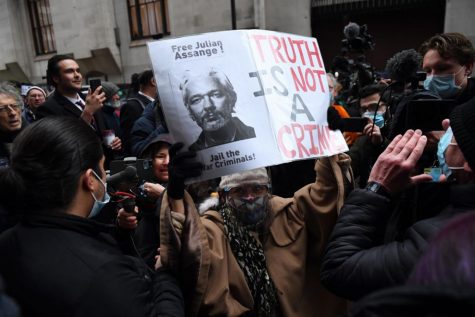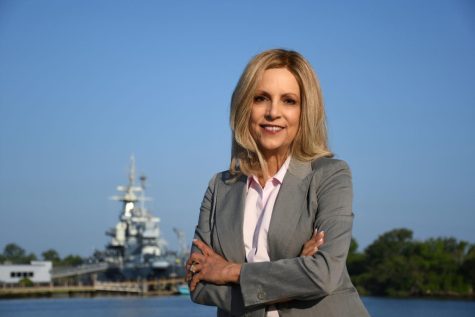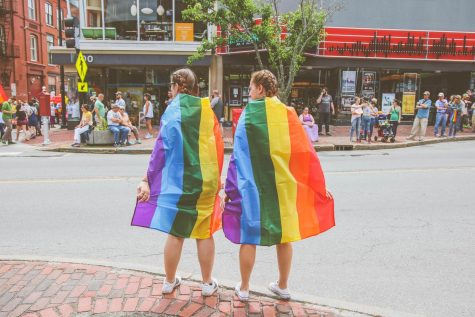OPINION: Trump failed to pardon Julian Assange is a dark moment for press freedom, limited government advocates
The human rights community has a lot to celebrate now that Donald Trump is no longer President of the U.S. There are no more bans on travelers from several Muslim countries. Migrant families are no longer separated at the U.S.-Mexico border. There is strong federal action against the climate crisis and rejoining the Paris Accords. There is a more unified and direct coronavirus response that will avert thousands more preventable deaths and return American life to normal faster.
But not everyone is happy.
The outgoing president refused to secure a pardon for WikiLeaks co-founder, Julian Assange. As its name suggests, the site is a database or “wiki” of leaked documents from various governments and militaries. Since its 2006 founding, the site has generated no shortage of controversy, with opponents slamming the site for publishing classified information and potentially jeopardizing national security. Assange was arrested in April 2019 in London after being evicted from the Ecuadorian embassy, where he had been in hiding since 2012. He has been held in British custody since pending possible U.S. extradition; despite being denied earlier this month, the U.S. plans to appeal. If they win, Assange could spend the rest of his life behind bars. Incoming president Joe Biden has also not shown any desire to even consider pardoning the WikiLeaks founder.
But supporters, including press-freedom and human-rights advocates argue the site has exposed hidden government corruption and transparency crises, and that security concerns that arose following a major 2010 leak never significantly materialized.

Photo by Chris J Ratcliffe – TNS (Chris J Ratcliffe)
That year, WikiLeaks published more than 700,000 files showcasing wrongdoings by American troops in the Middle East. The documents revealed hundreds of previously unknown killings of Afghani civilians by U.S. forces as well as the Iraq War’s civilian death toll being much higher than reported. One video even showed U.S. soldiers massacring multiple civilians and two Reuters journalists in 2007. These leaks revealed a shocking lack of transparency and accountability within the American government and especially the military, and they also underscored the country’s overinvolvement in foreign affairs and harmful obsession with war.
More recently, WikiLeaks published tens of thousands of hacked campaign emails from the Democratic National Committee during Hillary Clinton’s 2016 presidential run. They unraveled very alarming behavior by Committee officials towards then-Democratic presidential candidate Bernie Sanders, including one anti-Semitic comment directed at Sanders, who is Jewish. A few months later, thousands of emails between Clinton and campaign advisor John Podesta were leaked, revealing her hidden infatuation with Wall Street and lack of respect for the working class. The series of leaks, in addition to her suspicious use of a private email server while serving as Secretary of State, revealed just how untrustworthy Clinton is. Her popularity and chances of electoral victory both plunged in the final weeks of the 2016 race, costing her the election.
The documents sparked fierce backlash since they were obtained with the assistance of the Russian government, but publishing secret information obtained through questionable methods is surprisingly common in modern journalism. In 2014, for example, the Washington Post and Guardian won Pulitzer Prizes for their reporting of classified NSA files leaked by whistleblower Edward Snowden, who is facing up to 175 years behind bars for conspiring to hack government computers and espionage but was also not pardoned by Trump.
One of the most high-profile cases of this practice arose when Daniel Ellsberg leaked classified documents from the Pentagon about the Vietnam War that the New York Times then published without its permission. The Pentagon sued the paper, alleging detriment to U.S. national security. But the Supreme Court ultimately ruled in 1971 that the Times was allowed to publish the leaks, now known as the Pentagon Papers.
Over the years, Assange, Snowden and WikiLeaks have fought hard for press freedom and limited government. Trump’s refusal to pardon this hero should anger everyone who cares about these issues, especially considering his choice to pardon the Blackwater US military contractors, who were responsible for the deaths of several Iraqi civilians, but not the founder of the website that helped bring these atrocities to light. The former president’s hypocritical 11th-hour actions are also indicative of his overall personality: a desire to do what makes himself happy, not what makes his people happy. In an exclusive interview with Sputnik News, journalist and WikiLeaks proponent Kevin Gosztola argued that Trump only supported people who have “a few million dollars” as opposed to his country’s best interests.
Unfortunately, there is no indication President Biden is considering stepping up to the pardon plate. In 2010, when he was Barack Obama’s vice president, he called Assange a “hi-tech terrorist.” Biden has remained surprisingly mum on the WikiLeaks founder since then, especially during his presidential campaign, and it is hard to imagine him retracting his decade-old disparagement anytime soon. Unfortunately, that means a pardon for Assange is unlikely within the next several years, and the worst-case scenario of U.S. extradition and imprisonment remains probable.
The demise of the Trump administration is great news for human-rights advocates in the U.S. and beyond, considering its numerous failures and violations. Incoming President Biden has pledged to reverse almost all of its wrongdoings, from its infamous “Muslim ban” to its botched coronavirus response. But his ignorance and implied complicity in the prosecution of a journalist who has helped hold governments and politicians accountable marks a dark moment for global press freedom and significantly stains his pro-rights agenda.











